Jeff Wu
AIR: Post-training Data Selection for Reasoning via Attention Head Influence
Dec 15, 2025Abstract:LLMs achieve remarkable multi-step reasoning capabilities, yet effectively transferring these skills via post-training distillation remains challenging. Existing data selection methods, ranging from manual curation to heuristics based on length, entropy, or overall loss, fail to capture the causal importance of individual reasoning steps, limiting distillation efficiency. To address this, we propose Attention Influence for Reasoning (AIR), a principled, unsupervised and training-free framework that leverages mechanistic insights of the retrieval head to select high-value post-training data. AIR first identifies reasoning-critical attention heads of an off-the-shelf model, then constructs a weakened reference model with disabled head influence, and finally quantifies the resulting loss divergence as the Attention Influence Score. This score enables fine-grained assessment at both the step and sample levels, supporting step-level weighted fine-tuning and global sample selection. Experiments across multiple reasoning benchmarks show that AIR consistently improves reasoning accuracy, surpassing heuristic baselines and effectively isolating the most critical steps and samples. Our work establishes a mechanism-driven, data-efficient approach for reasoning distillation in LLMs.
Open Problems in Mechanistic Interpretability
Jan 27, 2025



Abstract:Mechanistic interpretability aims to understand the computational mechanisms underlying neural networks' capabilities in order to accomplish concrete scientific and engineering goals. Progress in this field thus promises to provide greater assurance over AI system behavior and shed light on exciting scientific questions about the nature of intelligence. Despite recent progress toward these goals, there are many open problems in the field that require solutions before many scientific and practical benefits can be realized: Our methods require both conceptual and practical improvements to reveal deeper insights; we must figure out how best to apply our methods in pursuit of specific goals; and the field must grapple with socio-technical challenges that influence and are influenced by our work. This forward-facing review discusses the current frontier of mechanistic interpretability and the open problems that the field may benefit from prioritizing.
Weak-to-Strong Generalization: Eliciting Strong Capabilities With Weak Supervision
Dec 14, 2023



Abstract:Widely used alignment techniques, such as reinforcement learning from human feedback (RLHF), rely on the ability of humans to supervise model behavior - for example, to evaluate whether a model faithfully followed instructions or generated safe outputs. However, future superhuman models will behave in complex ways too difficult for humans to reliably evaluate; humans will only be able to weakly supervise superhuman models. We study an analogy to this problem: can weak model supervision elicit the full capabilities of a much stronger model? We test this using a range of pretrained language models in the GPT-4 family on natural language processing (NLP), chess, and reward modeling tasks. We find that when we naively finetune strong pretrained models on labels generated by a weak model, they consistently perform better than their weak supervisors, a phenomenon we call weak-to-strong generalization. However, we are still far from recovering the full capabilities of strong models with naive finetuning alone, suggesting that techniques like RLHF may scale poorly to superhuman models without further work. We find that simple methods can often significantly improve weak-to-strong generalization: for example, when finetuning GPT-4 with a GPT-2-level supervisor and an auxiliary confidence loss, we can recover close to GPT-3.5-level performance on NLP tasks. Our results suggest that it is feasible to make empirical progress today on a fundamental challenge of aligning superhuman models.
Inference of Nonlinear Partial Differential Equations via Constrained Gaussian Processes
Dec 22, 2022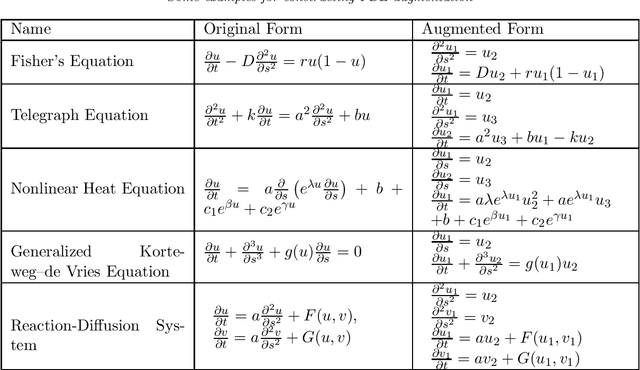
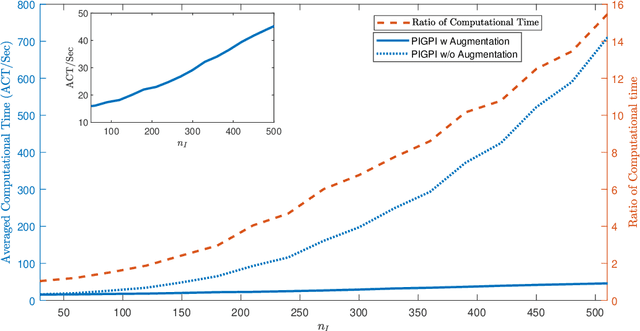


Abstract:Partial differential equations (PDEs) are widely used for description of physical and engineering phenomena. Some key parameters involved in PDEs, which represents certain physical properties with important scientific interpretations, are difficult or even impossible to be measured directly. Estimation of these parameters from noisy and sparse experimental data of related physical quantities is an important task. Many methods for PDE parameter inference involve a large number of evaluations of numerical solution of PDE through algorithms such as finite element method, which can be time-consuming especially for nonlinear PDEs. In this paper, we propose a novel method for estimating unknown parameters in PDEs, called PDE-Informed Gaussian Process Inference (PIGPI). Through modeling the PDE solution as a Gaussian process (GP), we derive the manifold constraints induced by the (linear) PDE structure such that under the constraints, the GP satisfies the PDE. For nonlinear PDEs, we propose an augmentation method that transfers the nonlinear PDE into an equivalent PDE system linear in all derivatives that our PIGPI can handle. PIGPI can be applied to multi-dimensional PDE systems and PDE systems with unobserved components. The method completely bypasses the numerical solver for PDE, thus achieving drastic savings in computation time, especially for nonlinear PDEs. Moreover, the PIGPI method can give the uncertainty quantification for both the unknown parameters and the PDE solution. The proposed method is demonstrated by several application examples from different areas.
Self-critiquing models for assisting human evaluators
Jun 14, 2022



Abstract:We fine-tune large language models to write natural language critiques (natural language critical comments) using behavioral cloning. On a topic-based summarization task, critiques written by our models help humans find flaws in summaries that they would have otherwise missed. Our models help find naturally occurring flaws in both model and human written summaries, and intentional flaws in summaries written by humans to be deliberately misleading. We study scaling properties of critiquing with both topic-based summarization and synthetic tasks. Larger models write more helpful critiques, and on most tasks, are better at self-critiquing, despite having harder-to-critique outputs. Larger models can also integrate their own self-critiques as feedback, refining their own summaries into better ones. Finally, we motivate and introduce a framework for comparing critiquing ability to generation and discrimination ability. Our measurements suggest that even large models may still have relevant knowledge they cannot or do not articulate as critiques. These results are a proof of concept for using AI-assisted human feedback to scale the supervision of machine learning systems to tasks that are difficult for humans to evaluate directly. We release our training datasets, as well as samples from our critique assistance experiments.
Training language models to follow instructions with human feedback
Mar 04, 2022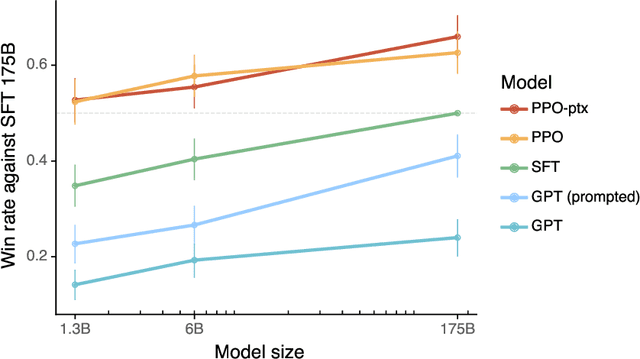
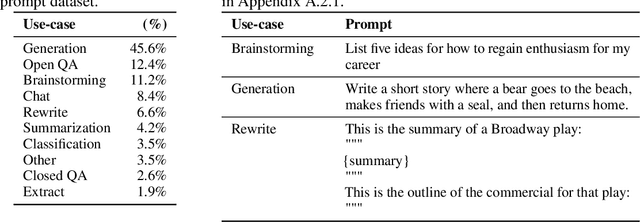
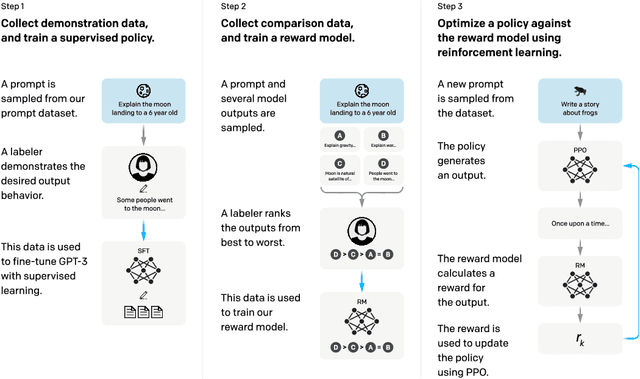

Abstract:Making language models bigger does not inherently make them better at following a user's intent. For example, large language models can generate outputs that are untruthful, toxic, or simply not helpful to the user. In other words, these models are not aligned with their users. In this paper, we show an avenue for aligning language models with user intent on a wide range of tasks by fine-tuning with human feedback. Starting with a set of labeler-written prompts and prompts submitted through the OpenAI API, we collect a dataset of labeler demonstrations of the desired model behavior, which we use to fine-tune GPT-3 using supervised learning. We then collect a dataset of rankings of model outputs, which we use to further fine-tune this supervised model using reinforcement learning from human feedback. We call the resulting models InstructGPT. In human evaluations on our prompt distribution, outputs from the 1.3B parameter InstructGPT model are preferred to outputs from the 175B GPT-3, despite having 100x fewer parameters. Moreover, InstructGPT models show improvements in truthfulness and reductions in toxic output generation while having minimal performance regressions on public NLP datasets. Even though InstructGPT still makes simple mistakes, our results show that fine-tuning with human feedback is a promising direction for aligning language models with human intent.
WebGPT: Browser-assisted question-answering with human feedback
Dec 17, 2021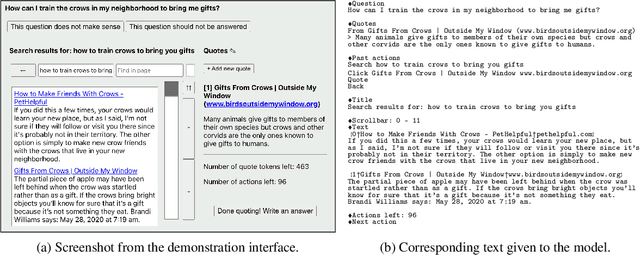

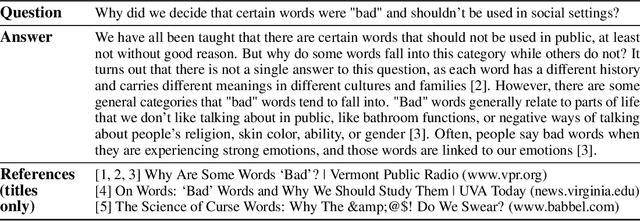
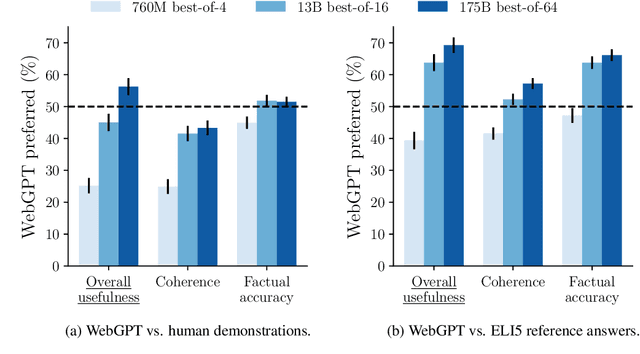
Abstract:We fine-tune GPT-3 to answer long-form questions using a text-based web-browsing environment, which allows the model to search and navigate the web. By setting up the task so that it can be performed by humans, we are able to train models on the task using imitation learning, and then optimize answer quality with human feedback. To make human evaluation of factual accuracy easier, models must collect references while browsing in support of their answers. We train and evaluate our models on ELI5, a dataset of questions asked by Reddit users. Our best model is obtained by fine-tuning GPT-3 using behavior cloning, and then performing rejection sampling against a reward model trained to predict human preferences. This model's answers are preferred by humans 56% of the time to those of our human demonstrators, and 69% of the time to the highest-voted answer from Reddit.
Recursively Summarizing Books with Human Feedback
Sep 27, 2021



Abstract:A major challenge for scaling machine learning is training models to perform tasks that are very difficult or time-consuming for humans to evaluate. We present progress on this problem on the task of abstractive summarization of entire fiction novels. Our method combines learning from human feedback with recursive task decomposition: we use models trained on smaller parts of the task to assist humans in giving feedback on the broader task. We collect a large volume of demonstrations and comparisons from human labelers, and fine-tune GPT-3 using behavioral cloning and reward modeling to do summarization recursively. At inference time, the model first summarizes small sections of the book and then recursively summarizes these summaries to produce a summary of the entire book. Our human labelers are able to supervise and evaluate the models quickly, despite not having read the entire books themselves. Our resulting model generates sensible summaries of entire books, even matching the quality of human-written summaries in a few cases ($\sim5\%$ of books). We achieve state-of-the-art results on the recent BookSum dataset for book-length summarization. A zero-shot question-answering model using these summaries achieves state-of-the-art results on the challenging NarrativeQA benchmark for answering questions about books and movie scripts. We release datasets of samples from our model.
Learning to summarize from human feedback
Sep 02, 2020



Abstract:As language models become more powerful, training and evaluation are increasingly bottlenecked by the data and metrics used for a particular task. For example, summarization models are often trained to predict human reference summaries and evaluated using ROUGE, but both of these metrics are rough proxies for what we really care about---summary quality. In this work, we show that it is possible to significantly improve summary quality by training a model to optimize for human preferences. We collect a large, high-quality dataset of human comparisons between summaries, train a model to predict the human-preferred summary, and use that model as a reward function to fine-tune a summarization policy using reinforcement learning. We apply our method to a version of the TL;DR dataset of Reddit posts and find that our models significantly outperform both human reference summaries and much larger models fine-tuned with supervised learning alone. Our models also transfer to CNN/DM news articles, producing summaries nearly as good as the human reference without any news-specific fine-tuning. We conduct extensive analyses to understand our human feedback dataset and fine-tuned models. We establish that our reward model generalizes to new datasets, and that optimizing our reward model results in better summaries than optimizing ROUGE according to humans. We hope the evidence from our paper motivates machine learning researchers to pay closer attention to how their training loss affects the model behavior they actually want.
Release Strategies and the Social Impacts of Language Models
Aug 24, 2019Abstract:Large language models have a range of beneficial uses: they can assist in prose, poetry, and programming; analyze dataset biases; and more. However, their flexibility and generative capabilities also raise misuse concerns. This report discusses OpenAI's work related to the release of its GPT-2 language model. It discusses staged release, which allows time between model releases to conduct risk and benefit analyses as model sizes increased. It also discusses ongoing partnership-based research and provides recommendations for better coordination and responsible publication in AI.
 Add to Chrome
Add to Chrome Add to Firefox
Add to Firefox Add to Edge
Add to Edge